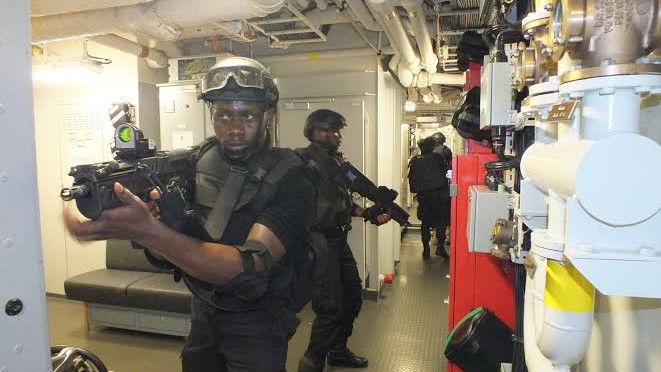Background
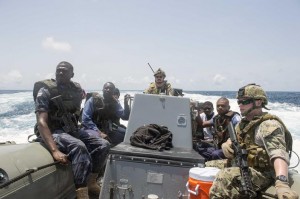
The Gulf of Guinea has a problem: Nigerian-driven maritime crime. Nigeria’s problem in turn is a thoroughly criminalised political and commercial elite and a largely disenfranchised electorate. The fallout of that state of affairs has an impact on the region’s security and stability. There is no short-term fix and it has become fashionable to recommend “improved governance” and anti-corruption measures to remedy the situation in the long run. This sort of advice is cheap. Beyond the obvious truth contained in them, there is little in such recommendations as to how to operationalise them or how to address the situation in practical terms as it is and will likely remain for the next years if not for decades.
The efforts of the African Partnership Station (APS) and the Africa Maritime Law Enforcement Partnership (AMLEP) are two military-political initiatives that seek to overcome the lack of practical value of general policy recommendations and to utilise the will and the resources that exist in the region to make the best of it in the maritime environment. Within this setting OBANGAME EXPRESS is an annual test since 2011 of what has been and what still needs to be achieved in West Africa’s maritime domain. APS and AMLEP, together with the French “Operation Corymbe” are the only sustained efforts to build and maintain regional maritime security capabilities in a region characteristic for its sea blindness and mutual distrust.
With the emergence of the Gulf of Guinea Code of Conduct in 2013 and subsequent agreements between various signatories, such as the Zone E Agreement between Nigeria, Benin, Togo and Niger, West Africa makes an attempt to replicate some of the hot pursuit agreement already in existence between Nigeria, Niger, Chad and Cameroon in the borderlands of the Nigerian North and North-East and transfer that model to a maritime environment. The chief difference is that the Gulf of Guinea Code of Conduct provides a multi-lateral approach with obvious political advantages, but equally obvious operational challenges given the widely divergent maritime security agendas (where they exist) of the signatories. This problem has been circumvented for the time being by breaking down the entire region encompassing the states of the Economic Community of West African States (ECOWAS) and Economic Community of Central African States (ECCAS) into manageable “zones” in order to be able to implement practical measures on the basis of the Code of Conduct more rapidly instead of having them negotiated by the entire forum. The zonal approach also allows individual states to shape the Code of Conduct according to their specific maritime security needs.
It is important to point out that maritime piracy (of whichever definition) is only one of many issues and for many regional states it is not even the most important or pressing one and thus not the driving force behind the Gulf of Guinea Code of Conduct. While piracy is costing the shipping industry and the region millions every year, the annual lost revenue from illegal fishing probably ranges in the several hundreds of millions while Nigeria alone loses approximately US$ 8bn per year from illegal bunkering and illegal crude oil exports. Much of the stolen oil leaves Nigeria by sea. The nexus of those criminal activities is transnational crime, often under the patronage of Nigerian elites. This makes it even more sensible to address the entire complex of maritime security as one and not just focus on a single symptom, however much this may exercise the pundits in the shipping journals and maritime security blogs.
OBANGAME EXPRESS 2014
Purpose
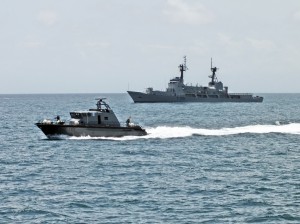
This year’s exercise OBANGAME EXPRESS was meant to be a litmus test of the applied Zone E Agreement, both on a command & control (C2) level as well as on a tactical level – chiefly by rehearsing vessel board seize & search (VBSS) procedures, rules of engagement (ROE) and maritime interdiction operations (MIO) with boarding teams. The purpose of OBANGAME EXPRESS 2014 was thus “to exercise and evaluate the regional interoperability, multinational command and control relationships, and proficiency of the regional maritime partners in the Gulf of Guinea.”
West African statesmen like to ascribe many if not all of the region’s maritime security woes to external factors and routinely call on the international community for support to resolve the problem. This year, their call was answered during OBANGAME EXPRESS 2014 which lasted from 16 April to 23 April 2014 and included extra-regional support beyond APS from Belgium, Germany, Turkey and Spain. “During the at-sea phase of the exercise, 11 nations, including were represented on board 36 different vessels hosting 20 different boarding teams. The boarding teams completed 47 boarding drills during three days of operations” summarised Exercise Director, Captain Nancy Lacore. Several Maritime Operation commands (MOC) were involved, specifically the Regional Maritime Awareness Centre (RMAC) at the Nigerian Navy’ Western Naval Command in Lagos, the ECCAS Centre pour la Coordination Multinationale (CMC) in Douala (Cameroon) and the Battalion d’Intervention Rapide MOC in Idenau (Cameroon). This was augmented by an embarked staffs, including a regional staff led by a Ghanaian admiral on the German combat support ship Bonn.
Conduct at sea
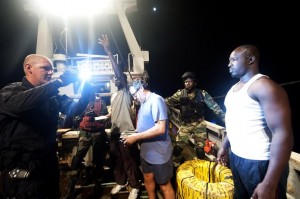
The at-sea phase was preceded by a pre-sail training for the MIO-teams by US, German and Spanish instructors. The at-sea phase from 19-21 April 2014 covered a range of scenarios including illegal fishing, arms smuggling, human trafficking, illegal bunkering and piracy. With the exception of the Bonn, which served as the embarked staff’s flagship, all extra-regional warships and some Nigerian Navy vessels served as target ships for the MIO-teams.
The experience made on board the German frigate Hamburg was representative for the conduct of the exercise and challenges experienced by the MIO teams and their proficiency. Teams from Benin, Nigeria and Togo boarded the Hamburg which alternatingly assumed the role of an illegally fishing vessel and a gun runner. The scenarios had been scripted by the American-led exercise control staff.
Of the three MIO-teams the Nigerian Special Boat Service (SBS) team deployed from NNS Thunder displayed the highest degree of professionalism, tactical acumen and ability to graduate their approach. Although clearly trained and conditioned with the hostile opposition of illegal bunkerers, kidnappers and hijackers in mind they were able to exercise restraint and judgement appropriate to the situation. In spite of good tactical procedures their primary challenge was communication between team elements as well as with their mothership. The latter in turn suffered from poor responsiveness of the MOC, which resulted in the SBS team being “stranded” on the target vessel for 2 hours until a decision to detain the suspect vessel and provide back-up for the team could be obtained.
The Beninese boarding team from the patrol boat Oueme was representative of the average MIO teams deployed by minor West African coastal states. The recent expansion of Nigerian piracy into Beninese waters and the aggressive response that Benin launched together with Nigeria in the form of “Operation Prosperity” had shaped their approach to VBSS. The team carried out the boarding with a high degree of pre-emptive violence including death threats. Modestly equipped and with poor communications to their own ship, the team was clearly aware of its vulnerability and consequently tense throughout the scenario.
The Togolese team, finally, represented the low end of experience found amongst some of the very small and unseasoned West African navies. The absence of even the most basic equipment for VBSS operations was reflective of the Togolese Navy’s operational readiness for this type of maritime security activity. When the team boarded the Hamburg it was only their third boarding (in the course of the exercise) and the third boarding of this kind ever conducted by the Togolese Navy. At that point all equipment – weapons, helmets, life vests and RHIB (including coxswain) had to be borrowed from the German Navy. Consequently they were tactically unready, though clearly willing to learn. Nevertheless, at that point they were overwhelmed by the scenario originally envisaged for them and ended up conducting a boarding of a very compliant fishing vessel under supervision of their instructors.
Conduct on shore
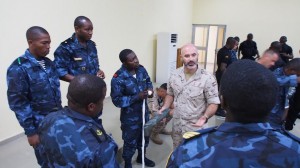
Command and Control – and the inadequacy of it as it was displayed during the exercise – was a recurring theme. This was not just a view of the exercise controllers but an almost universal complaint by commanding officers of most participating units, who felt they received neither the guidance nor the information they expected and needed to carry out their mission.
The exercise exposed significant deficiencies in the MOCs’ (especially RMAC’s) ability to build and maintain a situation picture and to share maritime domain awareness (MDA) information and to process requests for decision-making. Although technical shortcomings were cited during the debrief it was clear that the issue was really an organisational and training shortfall. This includes to some extent the ability to utilise technology at hand.
The RMAC used a commercially available AIS-tracking programme called Sea Vision in order to maintain a situation picture. Because many vessels in Nigerian coastal waters do not send AIS signals, it was to be augmented by an integration of radar pictures from coastal stations and assets afloat. This solution was only implemented belatedly (with the assistance of U.S. Navy personnel) and in the meantime the Nigerian Navy resorted to only monitoring AIS signals.
The effectiveness of the RMAC suffered further from a staff organisation that in addition to not having been prepared for the exercise also appeared to be less than capable of dealing with real world incidents and reports, some of which were forwarded directly to the RMAC by participating units or MOCs. Decision-making, even for pre-authorized scenarios, was routinely escalated to flag-officer level resulting in considerable delays or even in no decision being taken at all. Interagency information sharing and exchange of maritime domain awareness information, such as with NIMASA or NPA, or the Maritime Trade Information & Security Centre (MTISC) in Ghana, which was part of the exercise brief, was not evidenced – be it for exercise purposes or in real life.
Hot wash
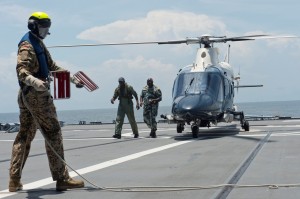
The exercise ended, predictably, with much back-patting of (especially Nigerian) top brass for a job well done. Clearly, the conduct of the exercise in itself is valuable and necessary, and arguably holding the exercise in that form was no mean feat (though the credit belongs mostly to the organisers from the U.S. Navy) however, more work needs to be done to achieve even a basic maritime security capability in the region. Beyond the preening of the Nigerian flag officers at the closing ceremony this challenge is largely understood and accepted on a working level of most Gulf of Guinea navies (ships’ commanders and exercise observers), many of whom expressed a genuine desire to continue their working relationships with the extra-regional navies. It will take time for this insight to permeate into the West African navies and until then it will need to be constantly refreshed in the minds of the West African senior naval officers and politicians.
Frustration over perceived African nonchalance or foot-dragging will continue to be a key experience for many U.S. and European participants in OBANGAME EXPRESS exercises in the foreseeable future. “FUBAR” as an American exercise staff member put it was probably the strongest characterization of what went during the exercise on at times, but as a Nigerian participant pointed out: just putting Nigerians and Cameroonians into the same room would have been unthinkable a year ago. So, is there hope after all?
Conclusion
The Gulf of Guinea continues to present the vexing challenge that those countries that jealously guard their right to establish maritime security are singularly incapable of doing so. Nevertheless, continual efforts like APS, AMLEP and Corymbe will provide incremental improvements or provide support for regional initiatives aimed at improving regional maritime security. Better operational maritime security capabilities will not address the problems of corruption, lack of prosecution or even the underlying transnational criminal structures, but as one of several practical measures for improving security they can encourage the willing and contain the unwilling and contribute to an improved security environment. Experience from other theatres, not least the Indian Ocean, have shown that such measures, while not eradicating the symptoms, can at least ameliorate them. While the complexity of this year’s OBANGAME EXPRESS may have overwhelmed some of the regional participants, it is important to keep the momentum going. Equally, extra-regional participants should not be discouraged by what may be perceived as slow (or non-existent) progress. It will be a long haul, measured in decades rather than years.
Dirk Steffen is a Commander (senior grade) in the German Naval Reserve with 12 years of active service between 1988 and 2000 and was assigned to the German Battlestaff of TG 501.01 on board FGS HAMBURG during Exercise OBANGAME EXPRESS 2014. He is normally Director Maritime Security at Risk Intelligence when not on loan to the German Navy. He has been covering the Gulf of Guinea as a consultant and analyst since 2004. The opinions expressed here are his alone, and do not represent those of any German military or governmental institutions.

